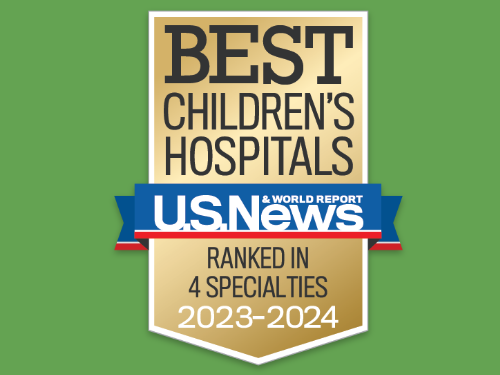Pediatric brain tumors are the second most common cancer in children, with approximately 2,500 to 3,500 brain tumors diagnosed in the United States each year.
Through the collaborative efforts of The University of Texas MD Anderson Children’s Cancer Hospital, Children’s Memorial Hermann Hospital and affiliated physicians from the McGovern Medical School at UTHealth, advances are being made in the treatment and survival of patients with brain and spinal cord tumors.
Knowing the signs
Brain tumors in children are often very different from those in adults, in cell type, presentation and responsiveness to treatment. Because a child’s brain is still developing, it is important for a child or adolescent to receive diagnosis and treatment from a physician team specializing in pediatric brain tumors.
Tumors present in a variety of ways depending on their location in the brain. The most common signs and symptoms are headache and vomiting due to elevated intracranial pressure. In infants and young children, irritability or a fontanelle that is fuller than normal may signal elevated intracranial pressure. Other signs and symptoms may include:
- Motor weakness
- Sensory changes
- Personality changes
- Vision changes
- Speech problems
- Endocrine disorders
- Unsteady gait
- Difficulty with muscle control
- Lethargy
- Seizures
How Is a Tumor in the Brain Evaluated?
When a tumor is suspected, the first step is neuroimaging. Usually MRI scanning with and without a contrast agent is the preferred study. The contrast agent is a drug given intravenously which can provide additional detail of the tumor and surrounding nervous system structures. Once the MRI is completed, treatment decisions are made. Usually a surgical biopsy or resection is performed. Pathologic evaluation of the tumor directs subsequent treatment choices, which include chemotherapy and/or radiation therapy.
Management of Pediatric Brain Tumors
Teaming together to treat brain tumors in children and adolescents
The Pediatric Brain Tumor Program brings together a team of experts affiliated with Children’s Memorial Hermann Hospital and MD Anderson Children’s Cancer Hospital to serve physicians, patients and families with new and advanced ways to diagnose and treat childhood brain tumors.
The pediatric brain tumor team includes board-certified specialists in:
- Pediatric neuro-oncology
- Pediatric neurosurgery
- Radiation oncology
- Neuroradiology
- Neuropathology
- Neuropsychology
- Survivorship
Additional support is provided by psychologists, nutritionists, social workers and child life specialists as well as developmental and education specialists.
With a family-centered approach, the team treats a variety of brain and spinal cord tumors, including:
- Medulloblastoma (primitive neuroectodermal tumor)
- Astrocytoma
- Glioblastoma multiforme (GBM)
- Ependymoma
- Choroid plexus papilloma and carcinoma
- Atypical teratoid-rhabdoid tumor (ATRT)
- Craniopharyngioma
- Ganglioglioma
- Dysembryoplastic neuroepithelial tumor (DNET)
- Germ cell tumor
The pediatric brain tumor team’s approach to treatment
Physicians with the Pediatric Brain Tumor Program partner with patients and families to deliver the best treatment tailored to children with brain and spinal tumors. In addition, the patient’s pediatrician will stay updated throughout the child’s care.
The program includes:
- Surgical treatment by board-certified, fellowship-trained pediatric neurosurgeons
- Comprehensive care provided by subspecialists from pediatric neuro-oncology, pediatric neurosurgery, radiation oncology and neuroradiology
- Expert diagnosis provided by board-certified oncologic neuropathologists
- Minimally invasive endoscopic techniques for resection of brain tumors
- Avoidance of ventriculoperitoneal shunting, when possible, for hydrocephalus
- Endoscopic transnasal and intraventricular approaches for selected tumors
- Access to MD Anderson’s BrainSUITE® to allow complex surgeries to be performed with real-time view of the tumor using intraoperative MRI in the operating suite
- Joint tumor board between specialists at Children’s Memorial Hermann Hospital and MD Anderson Children’s Cancer Hospital
- Proton radiation therapy with pencil-beam scanning and intensity-modulated proton therapy
- Single-center clinical trial for recurrent medulloblastoma, ependymoma and atypical teratoid-rhabdoid tumors using the direct infusion of chemotherapy into the fourth ventricle
- Access to multiple clinical trials for brain tumors
- Survivorship clinic offering integrated, long-term care for patients
Contact Us
If you have any questions, use the online tool below to help us connect with you. To refer a patient or schedule an appointment, please contact our clinic using the information below.
- Pediatric Stroke Clinic
UT Professional Building
6410 Fannin, Suite 500
Houston, TX 77030
P: (713) 500-7164 - Pediatric Neurosurgery Clinic
6410 Fannin Street, Suite 950
Houston, TX 77030
P: (832) 325-7234 - UTHealth Houston Gulf State Hemophilia and Thrombophilia Center
6655 Travis Street, Suite 100
Houston, TX 77030
P: (832) 325-7242
To contact Children's Memorial Hermann Hospital, please fill out the form below.
